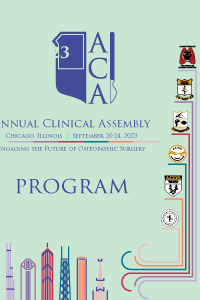- SR
Sheridan Rose, OMS-IV
Edward Via College of Osteopathic Medicine- Auburn Campus
Huntsville, Alabama, United States
Primary Presenter(s)
Patients with private healthcare plans often defer non-emergent or elective procedures towards the end of the year once they have met their deductible. No previous studies have evaluated how insurance status may impact surgical timing for elective bariatric procedures. Our study aimed to evaluate the influence of insurance on end-of-the-year surgical cases for elective bariatric procedures.
Methods or Case Description:
Patients who underwent a primary elective bariatric procedure using the following CPT codes 43775 (laparoscopic sleeve gastrectomy), 43644 (laparoscopic gastric bypass with Roux-en-Y), 43645 (laparoscopic gastric bypass and small intestine reconstruction) during a period from 1/1/21-12/31/22 at a private community hospital were identified. Using retrospective data and the Metabolic and Bariatric Surgery Accreditation and Quality Improvement Database (MBSAQIP) demographics including insurance status and insurance type, and date of surgery were collected. Patients were excluded from the study population if they were receiving a revisional procedure. Rates of elective bariatric procedures will be compared by fiscal quarter and insurance type (private or self-pay). Data was analyzed using the Poisson Process.
Outcomes:
Results showed that there was a non-significant increase in procedures for privately insured patients compared to self-pay from Q1 to Q4, with an average of 42 in Q1-2 and 47.5 in Q3-4. Interestingly, in Q2 self-pay patients underwent significantly more procedures compared to privately insured patients.
Conclusion:
Our data showed that more privately insured patients undergo elective sleeve gastrectomy procedures later in the year. However, it was not a significant increase compared to self-pay patients. Additional, work needs to be done to understand why a significant increase in self-pay patients were seen in Q2 when compared to insured patients. This was an unexpected result and may be limited to the years data was collected. Further data collection is being done to increase the power and generalization of the study.

